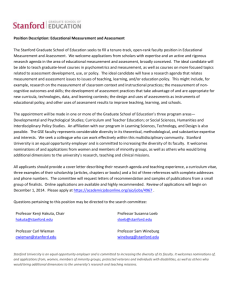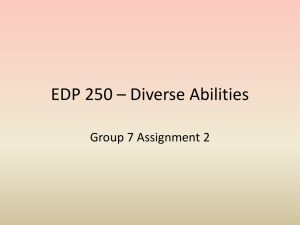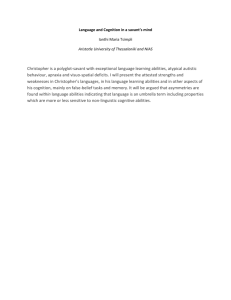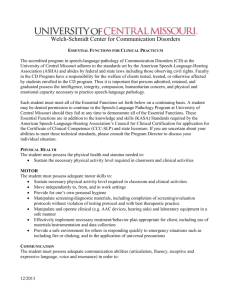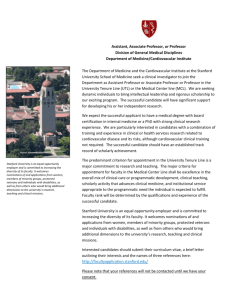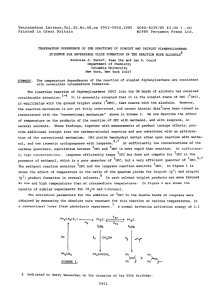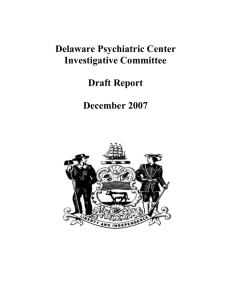Supplemental Application for the Stanford
advertisement
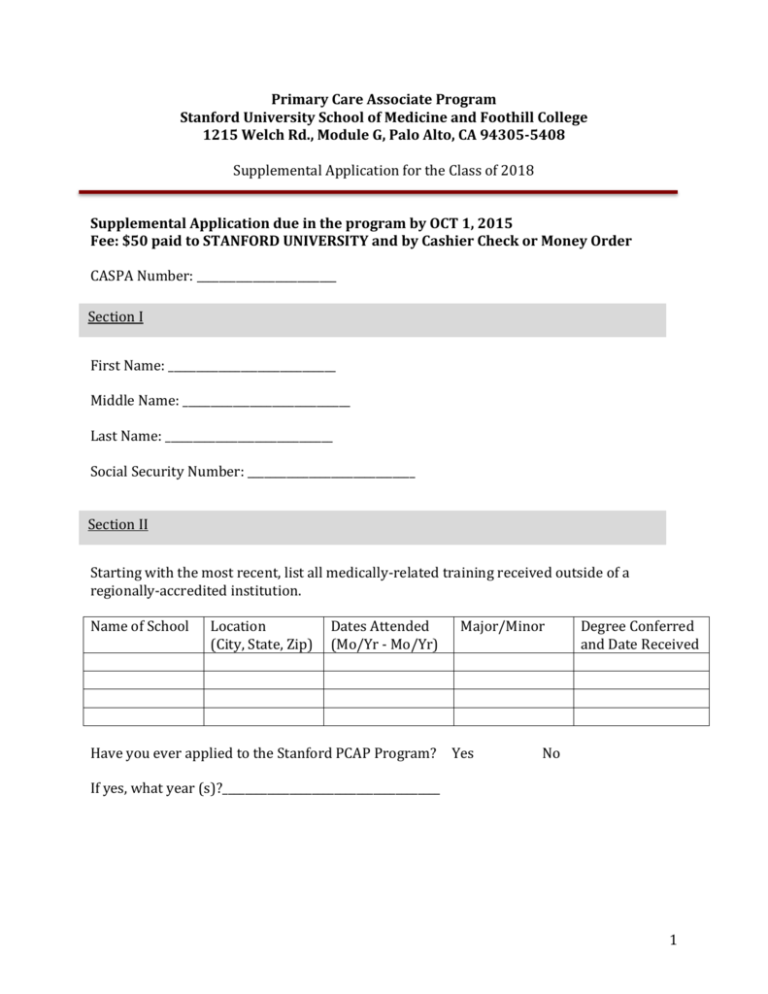
Primary Care Associate Program Stanford University School of Medicine and Foothill College 1215 Welch Rd., Module G, Palo Alto, CA 94305-5408 Supplemental Application for the Class of 2018 Supplemental Application due in the program by OCT 1, 2015 Fee: $50 paid to STANFORD UNIVERSITY and by Cashier Check or Money Order CASPA Number: _________________________ Section I First Name: ______________________________ Middle Name: ______________________________ Last Name: ______________________________ Social Security Number: ______________________________ Section II Starting with the most recent, list all medically-related training received outside of a regionally-accredited institution. Name of School Location (City, State, Zip) Dates Attended (Mo/Yr - Mo/Yr) Major/Minor Have you ever applied to the Stanford PCAP Program? Yes Degree Conferred and Date Received No If yes, what year (s)?_______________________________________ 1 Section III 1. Medical Experience: A minimum of 3,000 hours of direct patient-care experience must be completed in the USA and must be completed by October 1, 2015. Hours accrued, as a student in a training program cannot be counted. Starting with the most recent, list all medicallyrelated voluntary or paid positions held. The worksheet provided corresponds to the information provided in this section. If necessary, use a supplemental page as a continuation of this form. Do not refer reviewer to resume. Employer, Address and Phone Job Title, Mo/Yr-Mo/Yr Setting of Practice (i.e. Clinic,Hospital) Describe Roles, Responsibilities and Specific Skills Needed Involving Direct Patient Care. Include your scope of practice. 2. Hours of direct patient care responsibility (Please use the link to access the worksheet): Full-time : ______________________________ (Total months and hours) Part-time: ________________________ (Total months and hours) Worksheet showing Clinical Hours Calculations EXAMPLE ONLY (use "PCAP worksheet" for your information) Submit a completed copy with your application. Start table with the most recent information pcap.stanford.edu/admissions/Worksheet-GPAandDPC.xlsx Employers Start Date (M/D/Y) End date (M/D/Y) # of Weeks # of Hours Worked/Week Est.'d % of DPC DPC Hours 0.0 0.0 0.0 0.0 0.0 Sum Total 0.0 0.0 0.0 0.0 0.0 0.0 # Hours worked /Week must represent real estimate of the average time worked per week Est.'d % of DPC Contact (should be a whole number between 0 - 100) = % of time you actually worked with patients, not including transportation, idle or administrative time DPC Hours = (# of Weeks) X (# of Hours worked / week ) X (Estimated % of DPC Contact / 100. 2 3. Do you currently hold a license or certificate in a medically-related profession? Yes / No Type of license/certificate _________________________ License/Certificate # _________ Date license was first issued ________________________ Expiration date ______________ 4. Has any license and/or certificate been subject to disciplinary action by a regulatory agency? Yes No If yes, License/Certificate __________________________________Year ____________ *If yes, please describe the circumstances and the resolution. 5. Have you ever been terminated for cause by an employer? Yes No If yes, Employer __________________________________ Year ___________ *If yes, please describe the circumstances and the resolution. 3 Section IV 1. Community Service: Starting with the most recent, list all volunteer community service activities. Do not repeat positions listed under medical experience. If necessary, use a supplemental page as a continuation of this form. Community Organization, Supervisor Name, Address and Telephone Number Position, Mo/Yr-Mo/Yr, Total Hours Describe Leadership Roles, Responsibilities and Specific Skills Needed Total number of hours: 2. Residence Information: Starting with the most recent, list the types (e.g., rural, suburban, urban, inner city, low income, reservation) and names of communities you have lived in and your dates of residence. Use a supplemental page, if necessary. Type of Residence City, State Dates of Residence (Mo/Yr-Mo/Yr) 4 3. In which type of community or in what geographic location would you prefer to work after graduation from the PA program (circle all that apply)? Rural Urban Low income Suburban Inner city Reservation 4. We are interested in your commitment and goals as a PA. Please take a moment to reflect and write your responses to the following questions. Why are you applying specifically to the Stanford Program What makes you a good candidate to the Stanford Program Commitment and background experience Obstacles and challenges Future goals and ambitions (Maximum of 5000 characters (not words), in 12 point font or larger, or an equivalent) 5 5. TECHNICAL STANDARDS – Please read and sign. (Required) The abilities and skills which students must possess in order to complete the training associated with the Program are referred to as Technical Standards. These essential abilities are a group of minimal physical and cognitive abilities as well as sufficient mental and emotional stability to confirm that students are able to complete the entire course of study, participate fully in all aspects of PA training, and be deployable as competent PAs, with or without reasonable accommodation. Competency in technical standards will be assessed regularly throughout the Program. See checklist in appendix. The Program has the ethical responsibility for the safety of patients with whom students and graduates will come in contact, and to the public to assure that its graduates can become fully competent PAs. Thus, it is important that persons admitted to the Program possess the intelligence, integrity, compassion, humanitarian concern, and physical and emotional capacity necessary to practice medicine. Students must verify that they meet these Technical Standards prior to or at the time of matriculation to the Program and maintain them during their PCAP training. Students are obligated to alert the Program of any change in their ability to fulfill the Technical Standards. Students are subject to dismissal if they do not have minimal physical or cognitive abilities; sufficient mental or emotional stability to complete the entire course of study, participate fully in all aspects of PA training, or be deployable as competent PA’s (with or without reasonable accommodation); or otherwise do not meet the Technical Standards. Technical Standard I: Observation Students must be able to observe demonstrations and participate in physical examination sessions, clinical skills workshops, observe the difference of normal versus pathological states. They must be able to obtain a medical history and perform a complete physical examination in order to integrate findings based on these observations and to develop an appropriate diagnostic and treatment plan. Technical Standard II: Communication Students must be able to communicate effectively in classroom settings verbally, written, and by electronic means. Student must be able to communicate effectively and sensitively with patients, their families, and members of the health team. Students must be able to communicate effectively with patients from different social and cultural backgrounds, as well as develop effective professional rapport with patients and co-workers. Students must be able to record examination and diagnostics results clearly, accurately and efficiently. Students must be able to communicate effectively in English with patients, family and other health care professionals in a variety of patient settings. Technical Standard III: Motor Function Students must possess the capacity to perform physical examinations and diagnostic maneuvers. They must be able to respond to emergency situations in a timely manner and provide general and emergency care. They must possess adequate sensory function and motor coordination to fulfill minimum competency objectives for inspection, palpation, percussion and auscultation necessary to perform a physical examination. They must possess sufficient postural control, neuromuscular control and eye-to-hand coordination in order to utilize standard medical/surgical instruments to participate in the inpatient and outpatient setting and other clinical activities. 6 Technical Standard IV: Intellectual-Conceptual, Integrative and Quantitative Abilities Students must be able to learn through a variety of modalities including, but not limited to, classroom instruction; small group, team and collaborative activities; individual study; preparation and presentation of reports; and use electronic technology. Students must have the mental capacity to assimilate and learn a large amount of complex, technical and detailed information in order to formulate diagnostic and therapeutic plans. Technical Standard V: Behavioral and Social Attributes Students must have the emotional stability to function effectively under stress and to adapt to an environment that may change rapidly, without warning, and/or in unpredictable ways. They must accept responsibility for learning, exercising good judgment, and promptly completing all responsibilities during their academic training as well as attendant to the diagnosis and care of patients. They must understand the legal and ethical standards of the medical profession. Students must be able to work effectively, respectfully and professionally as part of the educational and healthcare team, and to interact with instructors and peers, patients, patient families, and health care personnel in a courteous, professional, and respectful manner. Students must be able to contribute to collaborative, constructive learning environments; accept constructive feedback from others; and take personal responsibility for making appropriate positive changes. Technical Standard VI: Ethical and Legal Standards Students must be able to understand the basis and content of both general and medical ethics. The student must possess attributes that include compassion, empathy, altruism, integrity, responsibility, and tolerance. Student must be able to recognize limitations in their knowledge, skills and abilities and to seek appropriate assistance with their identified limitations. Students whose performance is impaired by abuse of alcohol or other substances are not suitable candidates for admission, promotion, or graduation. In addition, should the student be charged or convicted of any misdemeanor or felony offense while in the Program, they agree to immediately notify the Program as to the nature of the legal difficulty. Failure to disclosure prior or new offenses can lead to disciplinary action that may include dismissal. Students must meet the legal standards to be licensed as a physician assistant in the State of California. Adapted from Stanford School of Medicine Technical Non-Academic Standard, http://med.stanford.edu/md/admissions/technical_standards.html, Accessed May 20, 2009; updated May 16, 2014 I have read the PCA Program’s Technical Standards and agree that I can demonstrate the abilities identified. Printed Name __________________________________ Signature ______________________________ Date _________ 7

